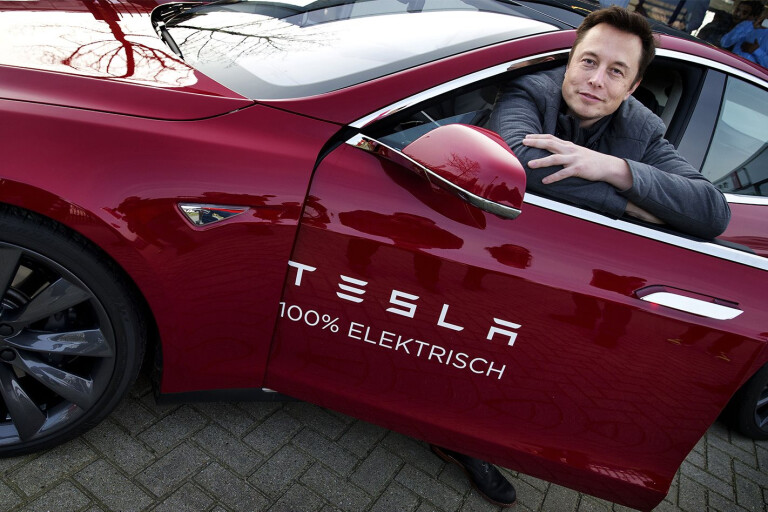
He’s founded and sold a multi-million dollar internet company, sent rockets into space, and now wants to redesign the car. What makes Tesla’s CEO tick?
WHO IS THIS BLOKE?
Born in South Africa, the 44-year-old Canadian-American entrepreneur-turned-tycoon famously sold the first fruits of his self-taught computer programming skills at age 12.
After first moving to Canada at 17, Musk would spearhead a US-based software start-up company, Zip2, at age 24. Its sale to Compaq in 1999, for $US341 million, helped bankroll the co-foundation of the leading Internet payment system, PayPal. After just three years, Musk sold PayPal to Ebay for a reported $US1.5 billion.
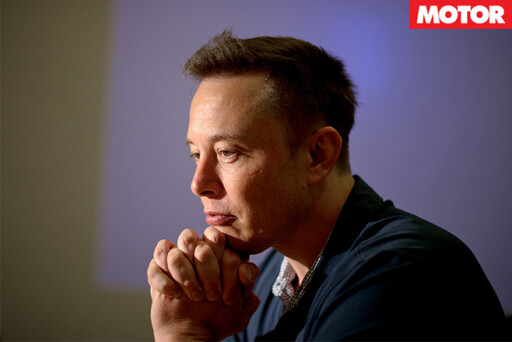 In 2002, one year prior to co-founding Tesla Motors, Musk, now an American citizen, invested $US100 million of his burgeoning personal fortune into Space Exploration Technologies (SpaceX), specialising in rocket technology and spacecraft, the long-game to commercialised space exploration.
In 2002, one year prior to co-founding Tesla Motors, Musk, now an American citizen, invested $US100 million of his burgeoning personal fortune into Space Exploration Technologies (SpaceX), specialising in rocket technology and spacecraft, the long-game to commercialised space exploration.
In 2003, Musk helped co-found Tesla Motors. Charged (no pun intended) with transforming Tesla’s electric car aspirations into a production reality in the throes of the global financial crisis, Musk took control of the fledgling carmaker in 2008, where he remains CEO and product chief.
Ever the industrialist, Musk’s gameplan within the Tesla framework reaches beyond global car marketing and into battery-swapping facilities, 480-volt ‘Supercharging’ charge station infrastructure – some 268 across North America, Europe and Asia – and licensing electric powertrain technology to other car companies.
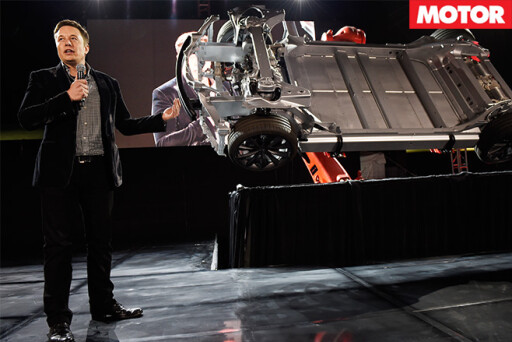 The third tier in Musk’s global business empire is SolarCity, cofounded in 2006, which today is one of America’s biggest solar-power installation concerns.
The third tier in Musk’s global business empire is SolarCity, cofounded in 2006, which today is one of America’s biggest solar-power installation concerns.
Tesla Motors, the first car company floated on the US stock exchange since 1956, is currently valued at US$26.84 billion while Musk’s current net worth, as majority shareholder, is said to be US$13 billion.
IS HE A CAR NUT OR JUST SOME MONEY-GRABBER?
Elon Musk is certainly no petrolhead by any traditional or literal definition. You’re not likely to find anyone in the automotive industry more anti-hydrocarbon burning and pro-clean energy, or at least anyone matching such high levels of power and influence in motoring commercialisation.
Musk, like many of the car industry’s shrewder forward thinkers and planners, seems as keen to invest in the potentially lucrative infrastructure requirements for plug-in electric technology as he is in marketing cars that use it. For example, a key alignment between his Tesla Motors and SolarCity companies is for the latter to help relieve the stress on the North American power grid system as demand for plug-in EVs expands.
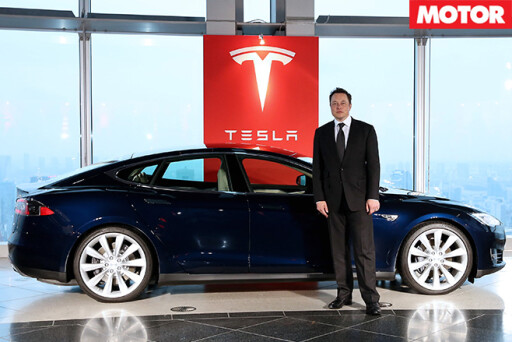 And, as with big-picture thinking in car company boardrooms across the globe, Musk’s focus is as much about mobility solutions as is about making cars. For instance, his latest Hyperloop aspiration, linking Los Angeles and San Francisco via an air-suspended solar-electric-powered high-speed rail system, is a pipedream of Tesla-SpaceX co-development.
And, as with big-picture thinking in car company boardrooms across the globe, Musk’s focus is as much about mobility solutions as is about making cars. For instance, his latest Hyperloop aspiration, linking Los Angeles and San Francisco via an air-suspended solar-electric-powered high-speed rail system, is a pipedream of Tesla-SpaceX co-development.
Musk came to cars through other core interests. Musk told GQ magazine in 2012 cars are the threat which unite everything he is working on, which is “sustainable energy, the Internet and space exploration.”
His early interest was computers, his tertiary study economics and physics, his early business windfalls an amalgamation of computer technology and e-commerce, and the backbone of his success is as much in spearheading engineering and design as it is in industrialisation and commercialising new technology.
Just 13 years young, Musk’s SpaceX company, after much initial failure, is already the first private company to return an orbited craft to Earth and send one to the International Space Station.
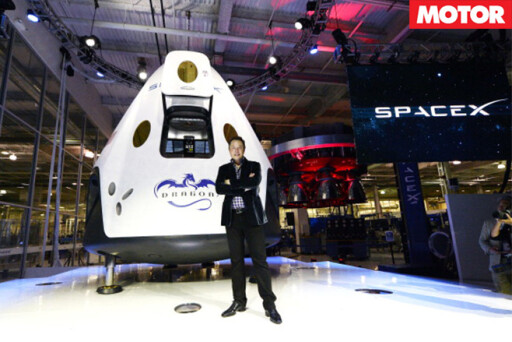 Importantly, SpaceX has secured a number of lucrative contracts with the US government worth hundreds of millions. In its first decade SpaceX had achieved 40 launches and amassed $4 billion in revenue from contracts.
Importantly, SpaceX has secured a number of lucrative contracts with the US government worth hundreds of millions. In its first decade SpaceX had achieved 40 launches and amassed $4 billion in revenue from contracts.
Just quietly, though, Musk is said to have a stash of collectible supercars. He did have a McLaren F1, but sold it because he didn’t like the environmental message it was presenting about him.
MUSK’S VISION FOR CARS
Musk predicts there will be a dramatic shift towards electric-powered vehicles between the next decade and 20 years. He believes even without the growing environmental impact of increased CO2 emissions, the world faces economic instability without other “sustainable motor transport” solutions.
However, he knows that the electric car’s move towards affordability and widespread adoption – getting millions of them on the road – is the only way to significantly impact carbon dioxide reductions.
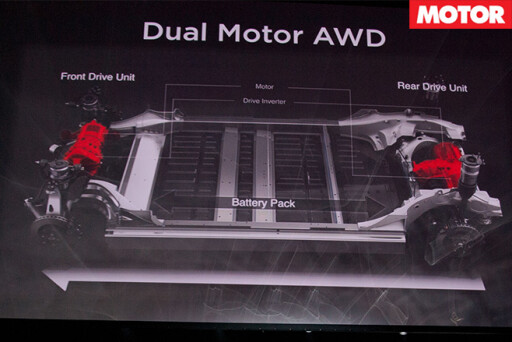 Thing is, it’s not necessary for Tesla to build affordable EVs. Part of the big picture is in technology sharing with others: on one hand with commercial tie-ups with existing giants (Toyota, Mercedes-Benz) and another by licensing its knowhow (see final paragraph).
Thing is, it’s not necessary for Tesla to build affordable EVs. Part of the big picture is in technology sharing with others: on one hand with commercial tie-ups with existing giants (Toyota, Mercedes-Benz) and another by licensing its knowhow (see final paragraph).
As for its own range, in October 2014, Tesla unveiled its Model S P85D (for Dual motor), a sedan that offers hypercar-matching 2.8sec 0-100km/h acceleration. Its predictable SUV follow-up, the Model X, is due to land sometime in 2016.
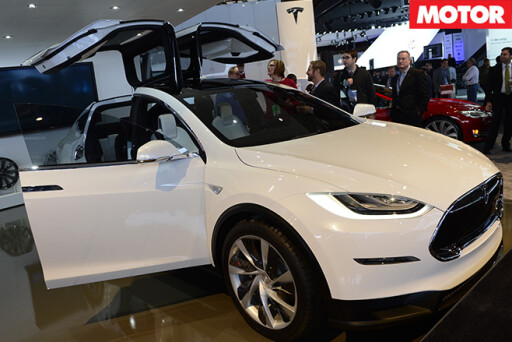 Autonomous cars? Tesla’s already fitting its Model S with a gamut of semi-autonomous tech, though Musk admitted self-driving vehicles could hit the road as soon as the year 2020 providing legislative and regulatory guidelines are shaken out first.
Autonomous cars? Tesla’s already fitting its Model S with a gamut of semi-autonomous tech, though Musk admitted self-driving vehicles could hit the road as soon as the year 2020 providing legislative and regulatory guidelines are shaken out first.
Fuel-cell technology? Forget it, says Musk. His take is that, compared with battery tech, hydrogen power is inefficient, expensive and even downright dangerous. Musk also believes it’s up to the car industry to push consumers towards electric power, not wait for Joe Public to come around to the idea.
IS TESLA IN FINANCIAL TROUBLE?
With his companies’ pipedreams burgeoning with activity, and Tesla’s increased local profile through the Australian launch of the Model S, it’s easy to presume Tesla’s fortunes are booming in line with Musk’s aspirations. Not necessarily so.
According to Forbes, Tesla, whose employees number 5859, has $2.4 billion in assets and creates $2.1 billion in revenue but runs at a multi-million dollar loss annually. Its existence is propped up from government money thanks, in large part, to Tesla’s sustainable energy credentials.
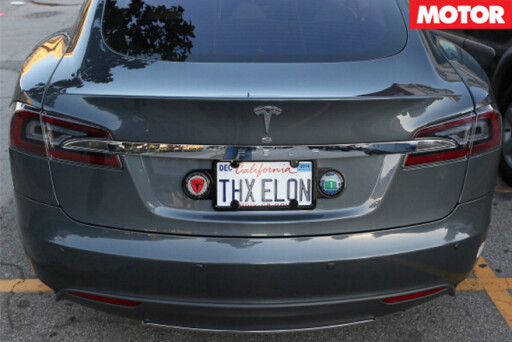 The reality is Tesla sells a few thousand cars per month globally, while large carmakers sells tens or hundreds of thousands of units. It’s a small fish in a big global pond.
The reality is Tesla sells a few thousand cars per month globally, while large carmakers sells tens or hundreds of thousands of units. It’s a small fish in a big global pond.
To expand his car business, Musk admits his company must move beyond its unorthodox direct-sales strategy that shuts out North America’s traditional dealership networks and even contravenes some US state legislation. At the time of writing there’s conjecture whether Tesla would be allowed to sell cars on Musk’s terms in Detroit.
Another current and continual pressure is the volatile swing of Tesla’s share price on the stock market which, at the time of writing, was in a slump low enough to grab business media headlines.
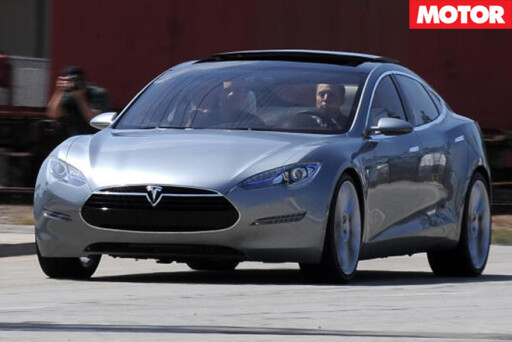 There’s speculation about how much fluctuating oil prices affect Tesla’s trade market performance but the fortune of electric car businesses are intrinsically tied to the changing moods of the consumer (and, thus, the changing price of petrol).
There’s speculation about how much fluctuating oil prices affect Tesla’s trade market performance but the fortune of electric car businesses are intrinsically tied to the changing moods of the consumer (and, thus, the changing price of petrol).
Quality control? The carmaker seems to have licked its early wounds that created, quite famously, a public spat between Musk and early Tesla adopter George Clooney.
Closer to home, Australia has a handful (but growing number) of supercharger stations suitable to fast charge the Model S and buyers are expected to put trust in Tesla’s promises of future improvement of EV-friendly infrastructure. Few suburban sub stations, let alone households, are equipped for a Model S to recharge at a rate that matches the Tesla’s claims.
TESLA V THE BIG BOYS
If you are to believe its CEO’s claims, Tesla’s key and noble role is as an impetus to spur on the world’s car industry to widespread and increasingly affordable EV vehicles.
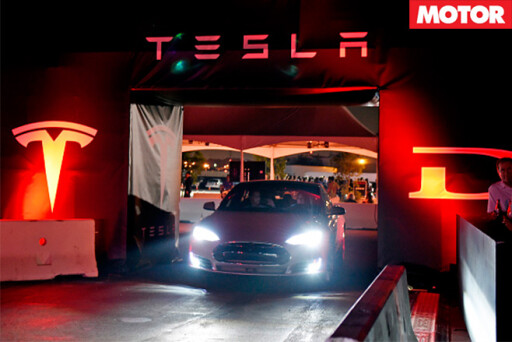 Many would argue the wider industry would move towards lower- or zero-emission technology regardless, and big players are doing just fine on the EV front without direct help from Tesla. It’s tough to argue, though, against Tesla’s role in helping popularise the electric car with buyers, particularly in the US.
Many would argue the wider industry would move towards lower- or zero-emission technology regardless, and big players are doing just fine on the EV front without direct help from Tesla. It’s tough to argue, though, against Tesla’s role in helping popularise the electric car with buyers, particularly in the US.
It was always Musk’s long game to hold the keys to EV technologies, particularly powertrain tech, commercialising Tesla through not just manufacturing but via patents and licensing agreements.
In June 2014, Tesla moved to allow its technology patents to be used by any concern on good faith (on the proviso Tesla retain rights and intellectual property) in a bold and unprecedented move to ignite widespread electric powertrain uptake in the car industry.
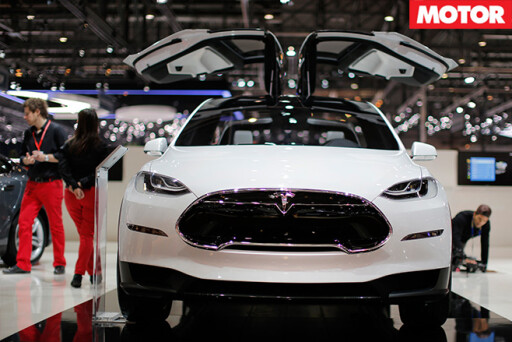 It’s an incredibly bold move, but one that may pay huge dividends not just for Tesla business but for Musk’s ideological goal of a future of more sustainable energy consumption. Expect technology sharing to becoming an increasingly large piece of the Tesla pie in future. A future which includes some seriously fast electric performance cars.
It’s an incredibly bold move, but one that may pay huge dividends not just for Tesla business but for Musk’s ideological goal of a future of more sustainable energy consumption. Expect technology sharing to becoming an increasingly large piece of the Tesla pie in future. A future which includes some seriously fast electric performance cars.
Mission to Mars
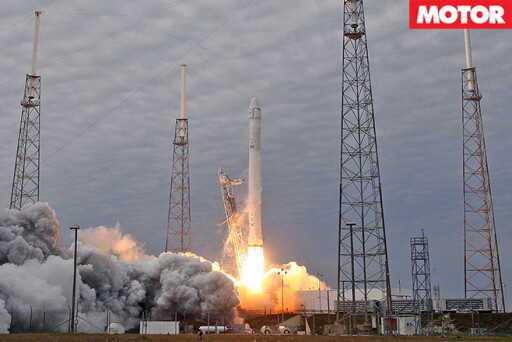 If mankind sends a manned mission to Mars, chances are Elon Musk will be aboard. That’s his dream and he’s simply driven, well-connected and rich enough to secure a ticket. He reckons mankind needs his input to get there.
If mankind sends a manned mission to Mars, chances are Elon Musk will be aboard. That’s his dream and he’s simply driven, well-connected and rich enough to secure a ticket. He reckons mankind needs his input to get there.
Importantly, funding-poor NASA can’t forge new frontiers alone. Musk believes that commercialising space travel is the only feasible way forward.
The biggest picture in Musk’s head is to make human life “multi-planetary”. And he certainly seems to be the key stakeholder audacious and driven enough to stitch a mission to Mars together.

COMMENTS